It has become increasingly evident that the gut is essential to our health and well-being. Research regarding the microbiome is booming with new studies published everyday.
Microbiome – a fancy term that means what, exactly? The microbiome consists of all the microorganisms (yes, we have lots of bugs in our system) and their collective genetic material in the human body. It’s composed of the bacteria, viruses, and fungi living in our guts. So, how does the microbiome function? In a variety of ways.
Modulates immune function
Regulates gut motility to achieve proper bowel habits
Improves nutritional status, particularly B vitamins, vitamin K, mineral absorption (Ca, Mg, Zn)
Produces protective short-chain fatty acids (SCFAs), which function as the key fuel for the cells in our colon and also help to strengthen immune function
Regulates metabolism to help maintain or achieve appropriate body weight
Mood management lessening the likelihood of anxiety and depression
Blood glucose control & insulin sensitivity to support proper carbohydrate metabolism
With these various roles, it’s not surprising to learn of the microbiome’s far-reaching effects. You expect that a compromised gut may lead you to experience indigestion, heartburn, diarrhea, constipation, abdominal pain, and/or bloating, but there is so much more. Did you know that the health of our microbiome is also linked with allergies, autoimmune conditions like Hashimoto’s thyroiditis and lupus, type 2 diabetes, cardiovascular disease, weight challenges and obesity, cancer, and your mental health?
Tips to Improve the Microbiome & Support Digestive Wellness
Eat a wide variety of plants; consume more fiber-rich whole foods, preferably organic vegetables, fruits, nuts/seeds, legumes, whole grains
Include vegetables with at least two of your daily meals
Opt for 50% or more of your plate to be filled with vegetables and other plant foods
Include both prebiotic and probiotic foods in the diet
Prebiotics - berries, flax, jicama, leeks, mushrooms, Jerusalem artichokes, garlic
Probiotics - fermented vegetables, kim chi, sauerkraut, kefir, yogurt, apple cider vinegar
Limit or avoid processed foods, foods high in added sugar, artificial sweeteners, and trans fats
Drink plenty of non-alcoholic and non-caffeinated fluids and do so with most fluid consumed between meals rather than with your meals
Eat regular meals of moderate volume
Take time to chew, relax, and enjoy your meal
Limit or avoid any foods to which you are sensitive, intolerant, or allergic and/or cause GI distress
Minimize use of antibiotics and antacids
Exercise
Manage stress
Take action to reduce the use of glyphosate on crops and in the environment
The gut can be a mysterious world. Want to learn more? Join me in a free webinar – Gastrointestinal Health & the Microbiome. Click HERE to register.

